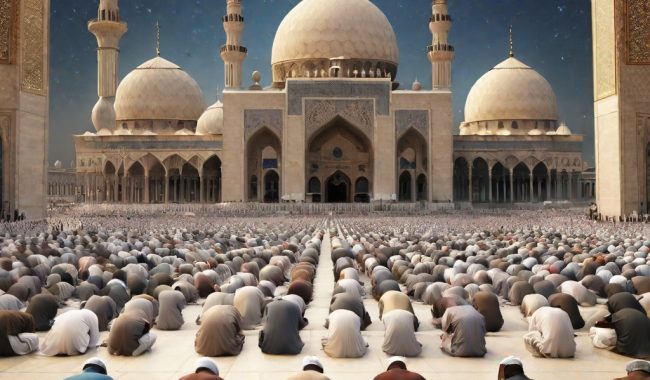
Salah (also known as Salat) is the Islamic prayer that is performed five times a day by Muslims around the world. It is one of the Five Pillars of Islam and is considered an essential part of the Muslim faith.
The five daily prayers are performed at specific times during the day and are called:
- Fajr: The pre-dawn prayer, which is performed before sunrise.
- Dhuhr: The midday prayer, which is performed after the sun has passed its zenith.
- Asr: The afternoon prayer, which is performed in the late afternoon.
- Maghrib: The evening prayer, which is performed just after sunset.
- Isha: The night prayer, which is performed after the twilight has disappeared.
Salah is performed facing towards the Kaaba, the holiest site in Islam, located in the city of Mecca in Saudi Arabia. During the prayer, Muslims recite specific verses from the Quran, and perform a series of physical movements, including standing, bowing, prostrating, and sitting.
Salah is not only a means of worship but also serves as a way for Muslims to connect with Allah and seek His guidance and forgiveness. It also serves as a reminder of the importance of gratitude, humility, and discipline in one’s daily life.
The importance of Salah in Islam is emphasized in both the Quran and the Ahadees. Here are some references:
Quran:
- “Establish prayer and give zakah, and bow with those who bow [in worship and obedience]” (Quran 2:43)
- “And establish prayer. Indeed, prayer prohibits immorality and wrongdoing, and the remembrance of Allah is greater. And Allah knows that which you do.” (Quran 29:45)
- “Recite, [O Muhammad], what has been revealed to you of the Book and establish prayer. Indeed, prayer prohibits immorality and wrongdoing, and the remembrance of Allah is greater. And Allah knows that which you do.” (Quran 29:45)
Sure, here are some references of Ahadees related to Salah:
- Abu Huraira reported: The Messenger of Allah (ﷺ) said, “The first of man’s deeds for which he will be called to account on the Day of Resurrection will be Salat. If it is found to be perfect, he will be safe and successful; but if it is incomplete, he will be unfortunate and a loser.” (Tirmidhi 413)
- Abdullah ibn Amr reported: The Prophet (ﷺ) said, “The prayer performed by a person who does not recite the Qur’an properly is deficient (and he repeated the word three times), incomplete.” (Abu Dawud 811)
- Abu Huraira reported: The Prophet (ﷺ) said, “The first thing for which a person will be brought to account on the Day of Resurrection will be his prayer. If it is found to be complete, he will be successful and safe, but if it is deficient, he will be unfortunate and a loser. If any of his obligatory prayers is lacking, the Lord, may He be glorified and exalted, will say, ‘See if my servant has any voluntary prayers.’ If he has any voluntary prayers, the obligatory prayers will be made up from them. Then the rest of his deeds will be reckoned in the same way.” (Tirmidhi 413)
- Jabir reported: The Messenger of Allah (ﷺ) said, “Between a man and disbelief and paganism is the abandonment of Salat.” (Muslim 82)
- Abu Huraira reported: The Messenger of Allah (ﷺ) said, “The covenant between us and them is prayer; whoever leaves it is a disbeliever.” (Tirmidhi 2621)
These Ahadees highlight the importance of Salah in Islam and its significance in the hereafter. They emphasize the need to perform Salah correctly, with proper recitation of the Quran and concentration, and warn against abandoning or neglecting it.
The Quran and Ahadees regarding the obligation of offering five daily prayers at particular times of the day:
Quran:
- “Indeed, prayer has been decreed upon the believers a decree of specified times.” (Quran 4:103)
- “Guard strictly your (habit of) prayers, especially the Middle Prayer; and stand before Allah in a devout (frame of mind).” (Quran 2:238)
Ahadees:
- Umar ibn Al-Khattab reported: The Messenger of Allah (ﷺ) said, “The time for the morning prayer is from the appearance of dawn, as long as the sun has not risen. The time for the noon prayer is from when the sun has passed its zenith and a man’s shadow is equal to his height, until the time for the afternoon prayer comes. The time for the afternoon prayer is from the time when the sun starts to decline from its zenith until the sun turns yellow. The time for the evening prayer is from the time when the sun has set until the twilight has disappeared. The time for the night prayer is from the time when the twilight has disappeared until the appearance of dawn.” (Muslim 612)
- Abu Huraira reported: The Messenger of Allah (ﷺ) said, “The most difficult prayer for the hypocrites is the night prayer and the morning prayer. If they knew the rewards for these prayers at their respective times, they would certainly present themselves in the mosques even if they had to crawl.” (Bukhari 657)
These references highlight that Salah has been prescribed to be offered at specific times during the day, as ordained by Allah. Muslims are required to perform these prayers at their designated times and are rewarded for doing so. The Ahadees also emphasize the importance of performing Salah at its designated time and the rewards for doing so.


